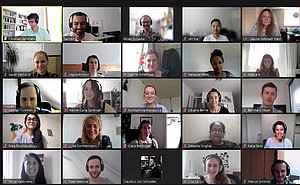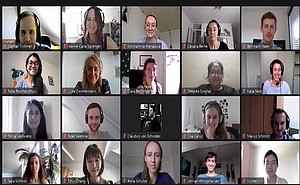Review of the final symposium & spring school of the Research Training Group 2350 in June 2021
From 7th to 10th June Ph.D. and M.D. candidates immersed themselves in a virtual event at the final symposium and spring school 2021 of the research training group 2350 on the Impact of Adverse Childhood Experiences on Psychosocial and Somatic Conditions across the Lifespan.
The research training group (Graduiertenkolleg; GRK) investigates psychosocial, neurobiological, and somatic sequelae of adverse childhood experiences (ACE), with central aims being:
(1) Investigation of the role of type, timing and intensity of adverse childhood experiences and protective factors in the emergence of ACE-related disorders;
(2) Elucidation of the psychosocial, neurobiological and epigenetic mechanisms underlying ACE-related psychiatric and somatic disorders;
(3) Development of novel psychosocial and pharmacological treatment possibilities as well as public health programs for ACE-related conditions.
The Event: The entire program was held online, but offered numerous opportunities for networking and exchange with colleagues and collaborators around the world through an interactive portal, such as live chats and virtual lounge. The event started with a welcome note by the GRK spokesperson Christian Schmahl. Throughout the event, there were keynote lectures given by renowned scholars in the field of psychosocial research and neuroscience. The main part consisted of project presentations of doctoral researchers from the first cohort who presented their work and achievements in their three years (2018 – 2021) with the research training group. Along with this, doctoral researchers from the second cohort also presented the planned projects for the following three years (2021 – 2024).
Keynote lectures: The keynote lectures were live-streamed and the speakers for the event were
- Professor Martin Hersch Teicher (Harvard University, USA) who is a pioneer on the effects of childhood maltreatment on brain development. He spoke about a new understanding of what resilience and recovery may entail in ACEs.
- Professor Katharina Domschke (University of Freiburg, Germany) is a renowned expert in the field genetics, epigenetics, pharmacogenetics, and gave us a wonderful insight into epigenetics of psychiatric disorders.
- Professor Chadi Touma (University of Osnabrück, Germany) spoke about the advantages and his findings on using a stress reactive mouse model explaining the genetic risk factors and early-life stress.
- Professor Sonja Entringer (Charité University Medicine Berlin, Germany) enriched our knowledge on the biological processes and mechanisms underlying the association between stress exposure in prenatal and early postnatal life and vulnerability for disease in later life.
- Professor Andreas Olsson (Karolinska Institutet, Stockholm, Sweden) gave a lecture on aversive experiences and learning in social situations – putting brain and behavior into context.
Final Symposium: The final symposium, designed for doctoral researchers from the first cohort, presented an excellent opportunity to present and discuss their interesting findings with collaborators within and outside Heidelberg University. In total, 18 project presentations were given, which also included the associated projects in the graduate school program. It is worth mentioning, that a number of doctoral researchers already published their work in reputed journals, while others have research articles currently undergoing review. It was interesting to watch and hear how each project took shape initially from 2018 and made new contributions in their fields of research interest.
During the Spring School Ph.D. and M.D. candidates of the second cohort presented their research proposal in a FLASHTALK format. At the end of the flash talk session, breakout session rooms were created for each project where the principal investigator and candidates from both cohorts were present to answer and discuss points related to their topic of focus. In total, 22 flash talks played across three days, which also included the associated projects.


